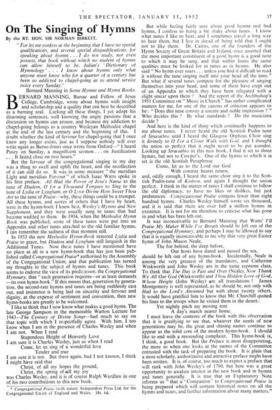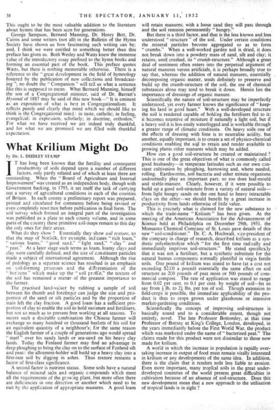On The Singing of Hymns
By the RT. HON. SIR NORMAN BIRKETT.
'For let me confess at the beginning that I have no special qualifications, and several special disqualifications, for speaking about hymns. . . 1 do not study, nor even possess, that book without which no student of hymns can allow himself to be, Julian's 'Dictionary of Hymnology' . . . I know about hymns only what anyone must know who for a quarter of a century has been so addicted to chapel-going as to attend service twice every Sunday."
Bernard Manning in Some Hymns and Hymn Books.
BERNARD MANNING, Bursar and Fellow of Jesus College, Cambridge, wrote about hymns with insight and scholarship and a quality that can best be described as a burning zeal. Lacking all these things, I yet adopt his disarming sentences, well knowing the angry passions that a discussion on hymns can arouse, and because my addiction to chapel-going belongs to a country Wesleyan Methodist chapel at the end of the last century and the beginning of this. I doubt whether the kind of fervour for chapel-going tharl once knew any longer exists, just as I suppose nobody will ever write again as Burne-Jones once wrote from Oxford—" I heard Pusey on Sunday, a magnificent sermon . . . on Justification .. . It lasted close on two hours."
But the fervour of the congregational singing in my day was a thing to swell and uplift the heart, and the recollection of it can still do so. It was in some measure "the meridian Light and meridian Fervour" of which Isaac Watts spoke in his first preface. All Hail the Power of Jesu's Name to the tune of Diadem, 0 for a Thousand Tongues to Sing to the tune of Lydia or Lyngham, or 0 Love Divine How Sweet Thou Art to the tune of Praise—why, these things could be a trumpet. All these hymns, and scores of others that I have by heart, were in the hymn-book I knew best, Wesley's Hymns and New Supplement, and they were usually sung to tunes that had become wedded to them. Itn 1904, when the Methodist Hymn Book was published, some of these tunes were put into an Appendix and other tunes attached to the old familiar hymns. I can remember the sadness of that moment still.
In 1933 the new Methodist Hymn-Book restored Lydia and Praise to grace, but Diadem and Lyngham still languish in the Additional Tunes. Now these tunes I have mentioned have no place at all in a new hymn-book that has just been pub- lished called Congregational Praise* authorised by the Assembly of the Congegational Union; and that publication has turned my thoughts to the subject of hymns and tunes. This book seems to endorse the view of its predecessor, the Congregational Hymnary, that " each generation requires—or at least demands —its own hymn-book." If this means that, generation by genera- tion, the second-rate hymns and tunes are being ruthlessly cast out, and insistence is being laid on sincerity and fervour and dignity, at the expense of sentiment and convention, then new hymn-books are greatly to be welcomed. I like to think that I now know what makes a good hymn. The late George Sampson in the memorable Warton Lecture for 1943—The Century of Divine Songs—had much to say on that topic with which I respectfully agree. With him, I too know when I am in the presence of Charles Wesley and when I am not. When I read Stupendous Height of Heavenly Love I am sure it is Charles Wesley, just as when I read Come, let us sing of a wonderful love Tender and true I am sure it is not. But there again, had I not known, I think I might have said that Christ, of all my hopes the ground, Christ, the spring ()Nall my joy was Charles Wesley, and it is of course Ralph Wardlaw in one of his two contributions to this new book.
* Congregational Praise (with tunes): Independent Press Ltd. for the Congregational Union of England and Wales. 18s. 6d.
But while feeling fairly sure about good hymns ind bad hymns, I confess to being a bit shaky about tunes. I know what tunes I like to hear, and I sometimes travel a long way to hear them, but I live in dread of being told that I ought not to like them. Dr. Cairns, one of the founders of the Hymn Society of Great Britain and Ireland, once asserted that the most important constituent of a good hymn is a good tune to which it may be sung, and that within limits the same qualities must be looked for in tunes as in hymns. He also said "No hymn ever soars .. . unless you find it difficult to read it without the tune singing itself into your head all the time." But what if several tunes compete for the pleasure of singing themselves into your head, and some of them have crept out of an Appendix to which they have been relegated with a slight smear upon them ? And the report of the Archbishop's 1951 Committee on " Music in Church" has rather complicated matters for me, for one of the canons of criticism appears to be: "Does this tune convey a sincere and noble impression ? " Who decides this ? By what standards ? Do the musicians decide ?
And here is the kind of thing which continually happens to me about tunes. I never heard the old Scottish Psalm tune of Stracathro until I heard the Glasgow Orpheus Choir sing it divinely to 0 For a Closer Walk with God, and I thought the union so perfect that it ought never to be put asunder. Looking up Stracathro in this new book, I find it set to three hymns, but not to Cowper's. One of the hymns to which it is set is the old Scottish Paraphrase Come, let us to the Lord our God With contrite hearts return, and, oddly enough, I heard the same choir sing it to the Scot- tish Psalm-tune of Kedron, and again I thought the union perfect. I think in the matter of tunes I shall continue to follow the old diplomacy, to have no likes or dislikes, but just preferences. Congregational Praise contains fewer than eight hundred hymns. Charles Wesley himself wrote six thousand, and it is said that there are over half a million hymns in existence. It is not for me therefore to criticise what has gone in and what has been left out.
It was inconceivable to Bernard Manning that Watts' I'll Praise My Maker While I've Breath should be "'left out of the Congregational Hymnary, and perhaps I may be allowed to say that it is equally inconceivable to me why that very great Easter hymn of John Mason Neale, The foe behind, the deep before, Our hosts have dared and passed the sea, should be left out of any hymn-book. Incidentally, Neale is among the very greatest of the translators, and Catherine Winkworth and John Wesley are in the same supreme class. To think that The Day is Past and Over (Neale), Now Thank We All Our God (Winkworth) and Thou Hidden Love of God, Whose Height (John Wesley) are all translations ! James Montgomery is well represented, as he should be, not only with Hail to the Lord's Anointed but with about twenty others. It would have gratified him to know that Mr. Churchill quoted his lines to the troops when he visited them in the desert: Yet nightly pitch my moving tent A day's march nearer home.
I must leave the contents of the book with this observation that it is gratifying td see that, whatever the needs of new generations may be, the great and shining names continue to appear as the solid core of the modern hymn-book. I should like to end with a resounding complaint. This hymn-book is, I think, a good book. But the Preface is most disappointing, the more so when one looks at the names of the Committee entrusted with the task of preparing the book. It is plain that a most scholarly, authoritative and attractive preface might have been written. It is, of course, too much to expect a preface that will rank with John Wesley's of 1780, but here was a great opportunity to awaken interest in the new book and in hymns and tunes generally. It is true that an Explanatory Note informs us "that a ' Companion ' to Congregational Praise is being prepared which will contain historical notes on all the hymns and tunes, and further information about many matters." • This ought to be the most valuable addition to the literature about hymns that has been seen for generations.
George Sampson, Bernard Manning, Dr. Henry Bett, Dr. Cairns and some writers (not all) in the Bulletin of the Hymn Society have shown .us how fascinating such writing can be; and. I think we were entitled to something better than this preface has given us. Both Wesley and Watts knew the immense value of the introductory essay prefixed to the hymn books and forming an essential part of the book. This preface quotes Watts, but there is nothing memorable otherwise. There is a reference to the "great development in the field of hymnology fostered by the publication of new collections and broadcast- ing "; no doubt the " Companion " will tell us what a sentence like this is supposed to mean. What Bernard Manning, himself the son of a Congregational minister, said of Dr. Barratt's Hymnal of 1887 may be said of this new book—" It is eminent as an exposition of what. is best in Congregationalism. It reflects purely and clearly that mind which we should like to think is the Congregational mind : in taste, catholic; in feeling, evangelical; in expression, scholarly; in doctrine, orthodox." For what we have received we are indeed truly thankful, and for what we are promised we are filled with thankful expectation.



































 Previous page
Previous page